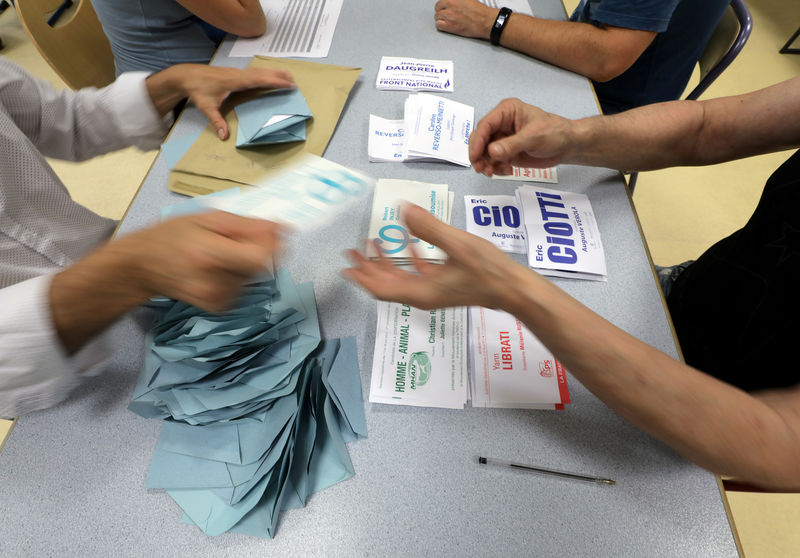By Elizabeth Pineau and Richard Lough
PARIS (Reuters) - President Emmanuel Macron and his supporters will seek to "restore the trust" of the French people after a record low turnout in the first round of the parliamentary election, Macron's government spokesman said on Monday.
Fewer than half of all registered voters cast a ballot on Sunday, unprecedented in France's post-war Fifth Republic, prompting some of Macron's opponents to cast doubt on the strength of the likely mandate of the president, who wants to quickly introduce economic reforms.
Pollsters blamed voter fatigue, disillusion with politicians and projections that Macron would secure a commanding majority for the high abstention rate.
Macron's party is still poised to win comfortably in the second round.
"It is a failure of this election," government spokesman Christope Castaner, who is also minister for parliamentary relations, told France 2 television. "We have to take note, we have to restore trust."
Other senior Republic on the Move (LREM) officials echoed Castaner, in an apparent bid to draw the sting out of criticism that might later complicate or tarnish the social and labor reforms that Macron wants to enact.
LREM president Catherine Barbaroux said the weak turnout would be a "key challenge for the government in the weeks to come". She said that as encouraging as Sunday's result was, more voters needed to get out in the second round.
Pollsters project LREM and its center-right Modem ally are on course to win as many as three quarters of 577 seats in the lower house next week.
Some Macron rivals are calling his future lawmakers "godillots", or yes men, a label given to President Charles De Gaulle's parliamentarians who were viewed as rubber-stamping his policies.
Jean-Luc Melenchon, the hard-left's failed presidential candidate, has warned voters against concentrating power in the hands of a single party loyal to a president who received less than one in every four votes in the opening round of the presidential election.
"The huge abstention rate shows that there is no majority in this country in favor of destroying the labor code, nor for reducing liberties ...nor to pander to the rich, all things that feature in the president's program," Melenchon said late on Sunday night.
INVESTOR CONFIDENCE
If forecasts that LREM and Modem win 390-445 seats prove correct, it would be France's biggest majority in decades, and would effectively leave only the powerful trade union movement as a potential obstacle to the former banker's reforms.
"If there is no debate in parliament it will take place in the street," said conservative candidate Nathalie Kosciusko-Morizet who faces a run-off in her constituency against a LREM candidate. "If there is no debate, parliament is reduced to being a chamber of record.
Investors shrugged off any concerns over turnout, buoyed by the scale of Macron's projected win and implications for reforms, in particular the relaxing of France's stringent labor code.
The thrust of the reforms is to allow a wider range of conditions to be set in the workplace rather than at sectoral level. Another goal is to set minimum/maximum compensation awards in unfair dismissal cases and speed up labor tribunal processing of such cases.
The vote delivered a further painful blow to the Socialist and conservative parties that had alternated in power for decades until Macron's election in May blew apart the left-right divide.
It was also a poor result for the far-right National Front, which just a month ago was dreaming of its anti-establishment leader Marine Le Pen holding the keys to the Elysee.
In a sign of the mood in the Socialist Party, Benoit Hamon, its failed presidential candidate also ejected from the parliamentary race, tweeted a picture of Sisyphus the greek mythological king embodying eternal work, and punishment.

(For Parliamentary election graphic, click http://tmsnrt.rs/2r9l3qw)